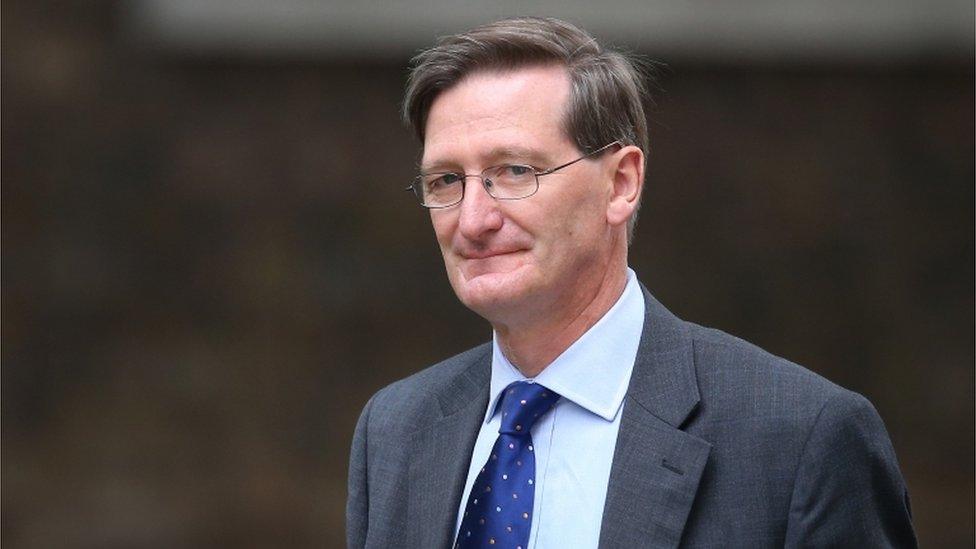Is Cameron's EU deal legally binding?
- Published

Does the European Court of Justice take precedence?
Red herring or genuine concern? Is Justice Secretary Michael Gove correct that the prime minister's renegotiation deal is not legally binding?
The government has rolled out big legal guns to slap down its justice secretary.
Attorney General Jeremy Wright QC and former Attorney General Dominic Grieve QC have strongly contradicted him.
Mr Wright said: "The suggestion that this agreement does not have legal effect until it is incorporated into EU treaties is not correct.
"It has legal effect from the point the UK says it intends to remain in the EU, and the European Court must take it into account.
"The job of the European Court is to interpret the agreements between the 28 nation states of the EU.
"This is one of those agreements, with equivalent legal force to other agreements such as treaties."
So, who is correct justice secretary or attorney general?
The agreement secured by David Cameron is not a formally ratified EU treaty.

The attorney general says the deal is legally binding
It cannot be ratified before the referendum because it is conditional upon a vote to remain in the EU.
Think of it a bit like a "pre-nuptial" agreement.
The parties have agreed what happens when they get married, but the agreement cannot really be "ratified" until that marriage actually takes place.
It is a legally biding agreement conditional upon marriage.
In the case of the UK's agreement, full ratification is likely to take years.
However, the agreement is already, in its pre-ratified form, a binding international legal agreement.
The Vienna Convention on the Law of Treaties makes clear states can express their consent to an international agreement in a variety of ways, including signature, acceptance or approval.
If it walks, talks and smells like a treaty, then it is a treaty.
What is important is the substance of the agreement and not the label "treaty".
As Mr Gove acknowledges, this is a "deal between 28 nations all of whom believe it". In other words, all of whom intend to be bound by it.
The more significant question is, perhaps, what is the value and status of the deal as a matter of EU law?
Michael Gove: EU court stands above nation states
It is intended to be fully compatible with the existing EU treaties - all of the member states agree on that.
However, it is not an amendment to the existing treaties and remains subject to the interpretation of the European Court of Justice (ECJ).
That may make it sound weak and vulnerable to legal challenge.
However, all measures of EU law under the existing treaties are subject to interpretation by the ECJ.
Should any state subsequently raise the issue of the relationship between the deal and the existing EU treaties, that would be a matter for the ECJ to rule upon.
Legal challenge chances slim
So, while some legal experts acknowledge a legal challenge is theoretically possible, the ECJ would give substantial weight to the fact all 28 member states had agreed both the deal and that it was compatible with the existing treaties.
That makes the chances of a successful legal challenge slim.
Prof Takis Tridimas, director of the Centre for European Law at King's College London, puts it more bluntly.
"Ultimately, the precise interpretation and effect of the UK's arrangements will be subject to the jurisdiction of the European Court of Justice," he says.
"However, it would be inconceivable for the European Court to ignore a binding commitment by all member states which has been endorsed by a popular referendum."

Former Attorney General Dominic Grieve also believes the deal is legally binding
The Justice Minister, Dominic Raab, disagrees.
"The EU's own legal advice makes clear the UK deal is based on vague assurances," he says.
"This is not the kind of legal guarantee you get when you buy a dishwasher, so you get your money back if it breaks down.
"Ultimately, it is crystal clear the Luxembourg court will have the last word as to what sticks, and it is free not to enforce the British deal."
Case law from the European Court of Justice makes it clear that if it were ever to consider a legal challenge to the UK's deal, it would have to take into consideration that it was an international agreement between all of the EU's member states.
That does appear to leave room for the ECJ to consider the agreement and go on to rule it was not legally enforceable.
The possibility cannot be eliminated - but, to put it in Mr Raab's terms, if the UK's dishwasher breaks down, most lawyers believe the nation's money is pretty safe.
- Published24 February 2016
